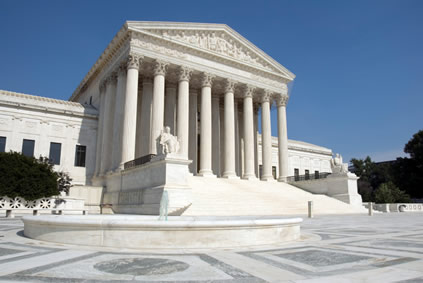Abercrombie claims that job applicants must explain their religious beliefs before the law can protect them Becket Fund files Supreme Court friend-of-the court brief to protect people of faith seeking jobs
Media Contact
Ryan Colby 202-349-7219 media@becketlaw.org
Additional Information

Washington, D.C. – In the closely watched Supreme Court case, EEOC v. Abercrombie, Becket filed a brief debunking Abercrombie’s claim that a Muslim job applicant should have explained during her job interview she was wearing a headscarf for religious reasons in order to be protected by antidiscrimination laws.
“Abercrombie’s claim is both an absurd and dangerous precedent for all people of faith seeking employment,” said Eric Baxter, Senior Counsel at Becket. “Justice may be blind, but that doesn’t mean employers can cover their eyes. A job applicant does not have to bring a ‘Look at me – I am religious’ sign to an interview just to keep her civil rights.”
The case deals with the employment application of Samantha Elauf, a Muslim girl who was 17 years old when she applied for a job at Abercrombie & Fitch. She knew the company dress code prohibited hats but had previously hired a Jewish employee who wore a yarmulke, so she never imagined that her headscarf might be an issue. The store manager who interviewed Samantha scored her high enough to be hired, but when the district manager learned about Samantha’s headscarf, he told the store manager to lower her score so it would appear she was unqualified for the job. Abercrombie is claiming that Samantha was not protected by Title VII’s prohibition against religious discrimination because she never explicitly stated that her headscarf was worn for religious reasons.
“The law may not assume that people are irreligious unless proven otherwise, and it should not assume that the workplace is a religion-free zone,” added Baxter.
The Equal Employment Opportunity Commission (EEOC) filed a lawsuit on behalf of Samantha and prevailed on her behalf in the district court in July 2011, but then lost on appeal in the Tenth Circuit Court of Appeals on October 2013. In October of this year, the United States Supreme Court agreed to hear Samantha’s case.
Becket is a non-profit, public-interest law firm dedicated to protecting the free expression of all religious traditions. For over 20 years, it has defended clients of all faiths, including: Buddhists, Christians, Jews, Hindus, Muslims, Native Americans, Sikhs, and Zoroastrians. Its recent cases include two major Supreme Court victories: the landmark ruling in Burwell v. Hobby Lobby, and the 9-0 ruling in Hosanna-Tabor v. EEOC, which The Wall Street Journal called one of “the most important religious liberty cases in a half century.”
###
For more information, or to arrange an interview with one of the attorneys, please contact Melinda Skea at media@becketlaw.org or call 202.349.7224.